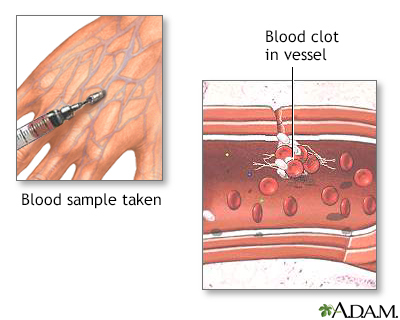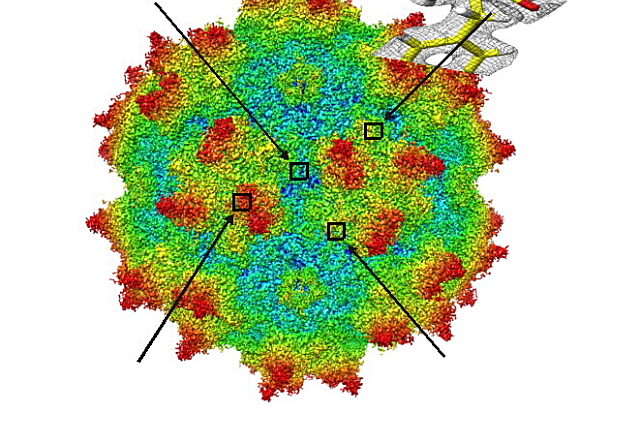- Investigator
- Tung T Wynn
- Status
- Accepting Candidates
Hemophilia
Definition
Hemophilia refers to a group of bleeding disorders in which blood clotting takes a long time.
There are two forms of hemophilia:
- Hemophilia A (classic hemophilia, or factor VIII deficiency)
- Hemophilia B (Christmas disease, or factor IX deficiency)
Alternative Names
Hemophilia A; Classic hemophilia; Factor VIII deficiency; Hemophilia B; Christmas disease; Factor IX deficiency; Bleeding disorder - hemophilia
Causes
When you bleed, a series of reactions take place in the body that helps blood clots form. This process is called the coagulation cascade. It involves special proteins called coagulation, or clotting factors. You may have a higher chance of excess bleeding if one or more of these factors are missing or aren't functioning like they should.
Hemophilia is caused by the lack of clotting factor VIII or IX in the blood. In most cases, hemophilia is passed down through families (inherited). Most of the time, it is passed to male children.
Symptoms
The main symptom of hemophilia is bleeding. Mild cases may not be detected until later in life, after excessive bleeding following surgery or an injury.
In the worst cases, bleeding occurs for no reason. Internal bleeding may occur anywhere and bleeding into joints is common.
Exams and Tests
Most often, hemophilia is diagnosed after a person has an abnormal bleeding episode. It can also be diagnosed by a blood test done to detect the problem, if other family members have the condition.
Treatment
The most common treatment is to replace the missing clotting factor in the blood through a vein (intravenous infusions).
Special care during surgery needs to be taken if you have this bleeding disorder. So, be sure to tell your surgeon that you have this disorder.
It is also very important to share information about your disorder with blood relatives as they may also be affected.
Support Groups
Joining a support group where members share common issues can relieve the stress of a long-term (chronic) disease.
Outlook (Prognosis)
Most people with hemophilia are able to do normal activities. But some people have bleeding into the joints, which may limit their activity.
A small number of people with hemophilia may die of severe bleeding.
Gallery

References
Carcao M, Moorehead P, Lillicrap D. Hemophilia A and B. In: Hoffman R, Benz EJ, Silberstein LE, et al, eds. Hematology: Basic Principles and Practice. 7th ed. Philadelphia, PA: Elsevier; 2018:chap 135.
Hall JE, Hall ME. Hemostasis and blood coagulation. In: Hall JE, Hall ME, eds. Guyton and Hall Textbook of Medical Physiology. 14th ed. Philadelphia, PA: Elsevier; 2021:chap 37.
Ragni MV. Hemorrhagic disorders: coagulation factor deficiencies. In: Goldman L, Schafer AI, eds. Goldman-Cecil Medicine. 26th ed. Philadelphia, PA: Elsevier; 2020:chap 165.
Related specialties
Our locations
Our experts
Clinical Trials: Hemophilia
UF Health research scientists make medicine better every day. They discover new ways to help people by running clinical trials. When you join a clinical trial, you can get advanced medical care. Sometimes years before it's available everywhere. You can also help make medicine better for everyone else. If you'd like to learn more about clinical trials, visit our clinical trials page. Or click one of the links below:
- Investigator
- Tung T Wynn
- Status
- Accepting Candidates
Community and Patient Programs: Hemophilia
Our community and patient programs provide great value to patients, families and loved ones. People can find support, educational materials, expert consultants and more. In most instances, these programs are offered free of charge.
-
Camp Boggy Creek
Children with serious illnesses can enjoy a camp experience in a safe, medically sound environment.
News and Patient Stories: Hemophilia
Sickle Cell Loses and Sydnee Wins
“I’m active, a little bit crazy, but I’m mostly fun,” Sydnee Murphy, 8, said when asked to describe herself. Sydnee is a second grader at Westside Elementary…

UF Health researchers, collaborators get unprecedented view of gene therapy virus
September 17, 2018
Researchers from University of Florida Health and the Salk Institute have obtained an unprecedented view of a gene-delivery virus, paving the way for further…
Department of Biochemistry and Molecular Biology, Florida Blue Center for Health Care Quality, +4 more

Latest podcast episodes
Power of plants can help people who have hemophilia
Hemophilia, a disease linked with legends of European monarchs, frail heirs and one flamboyant charlatan called...
